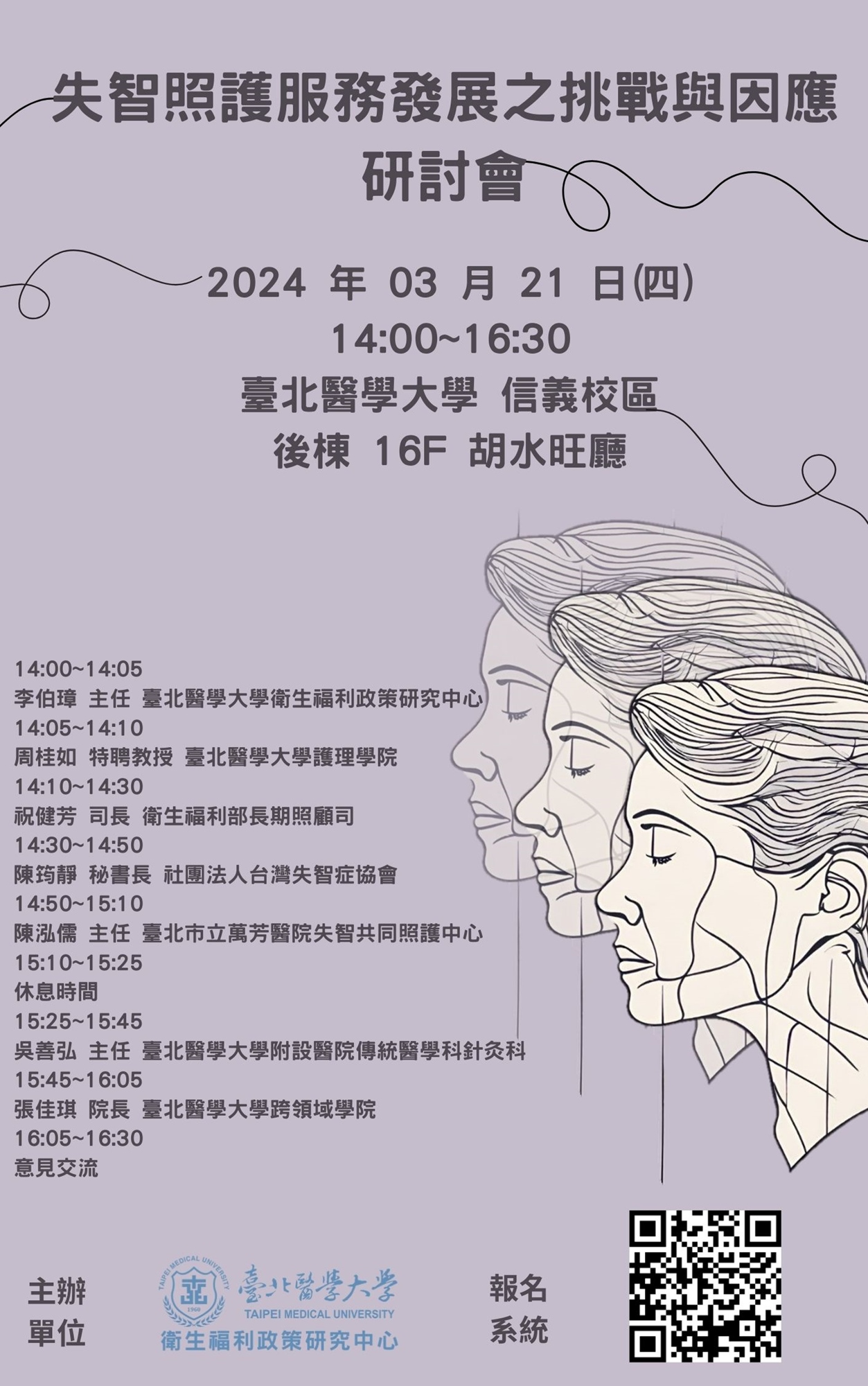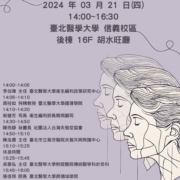【Center Activity】Seminar on the Challenges and Responses in the Development of Dementia Care Services.
【Center Activity】Seminar on Challenges and Responses in the Development of Dementia Care Services
Registration System: https://www.accupass.com/event/2403050705083784685000
※ URL for registration by university faculty and staff: https://reurl.cc/13Njm9
※ You still need to log in to the TMU Talent Development System to enroll in the course. The credit hours will only be recognized after completing the questionnaire. (2.5 CFD hours for TMU staff and faculty)
Date: March 21, 2024 (Thursday) 14:00~16:30 Venue: Hu Shuiwang Hall, 16F, Medical Complex Building, Taipei Medical University, Xinyi Campus Address: No. 250, Wuxing St., Xinyi District, Taipei City Organizer: Center for Health and Welfare Policy Research, Taipei Medical University
In Taiwan, the prevalence of dementia among the population aged 65 and over has increased rapidly from 1.7% in 1990 to 4.8% in 2020. With the aging population trend, it is estimated that by 2050, the prevalence of dementia in Taiwan may reach as high as 15%, with nearly 2 million patients, triple the current number. The increasing trend of dementia in Taiwan is expected to make it one of the countries with the highest concentration of dementia in the world’s super-aging societies.
Currently, institutional care is the main form of care for dementia patients in Taiwan, accounting for 60% of all forms of care. In contrast, the network of community-based long-term care and support services for home-based living is relatively lacking, putting heavy pressure on dementia families. Although the government’s long-term care 2.0 policy continues to expand capacity, there is still a lack of comprehensive and specific strengthening measures for community-dwelling dementia patients. The current long-term care budget also lacks clear allocation specifically for the needs of dementia care. Family caregivers who are primarily responsible for caregiving often face unimaginable stress. A survey of caregiver stress index shows that the average caregiving stress of dementia patients’ family members in Taiwan is 56 points (out of a full score of 120), indicating significant emotional distress. Additionally, only 12% of family caregivers have received systematic dementia care training, indicating a general lack of correct and comprehensive caregiving knowledge among family caregivers.
Taiwan’s dementia care system needs to actively transition towards community-based and localized care. By providing comprehensive home care and rehabilitation services, improving the local connection and capacity of long-term care, and increasing the possibility of dementia patients living at home, reliance on institutional care facilities can be reduced to achieve normalization of life. Secondly, future long-term care policies should directly address the greatest challenge of dementia care. Specific strengthening support measures and clear allocation should be proposed in legislation and budget allocation to fully assume the national care responsibility. Strengthening economic subsidies for family caregivers, as well as emotional support and caregiving education and training, can further empower and reduce their heavy stress, providing needed assistance to dementia families. Lastly, leveraging technology and innovative models to improve care efficiency, integrating with the healthcare system to provide holistic care for dementia patients, can establish a comprehensive dementia-friendly environment.
Agenda:
14:00~14:05 Welcome Remarks by Director Lee Po-Chang, Center for Health and Welfare Policy Research, Taipei Medical University
14:05~14:10 Address by Professor Chou Kuei-Ju, Taipei Medical University School of Nursing
14:10~14:30 Director Chu Chien-Fang, Long-term Care Division, Department of Health and Welfare
14:30~14:50 Secretary-General Chen Yun-Ching, Taiwan Alzheimer’s Disease Association
Supporting Dementia Families – Social Resources, Advance Planning, and Care Systems
14:50~15:10 Director Chen Hong-Ju, Dementia Co-Care Center, Taipei City Hospital
Challenges in Dementia Care – Perspectives from Urban Hospitals
15:10~15:25 Break
15:25~15:45 Director Wu Shan-Hong, Department of Traditional Chinese Medicine Acupuncture, Taipei Medical University Hospital
The Role and Challenges of Traditional Chinese Medicine Care in Dementia Care
15:45~16:05 Dean Chang Chia-Chi, Taipei Medical University Interdisciplinary College
Empowering and Supporting Dementia Families through the iSupport Program
16:05~16:30 Panel Discussion




